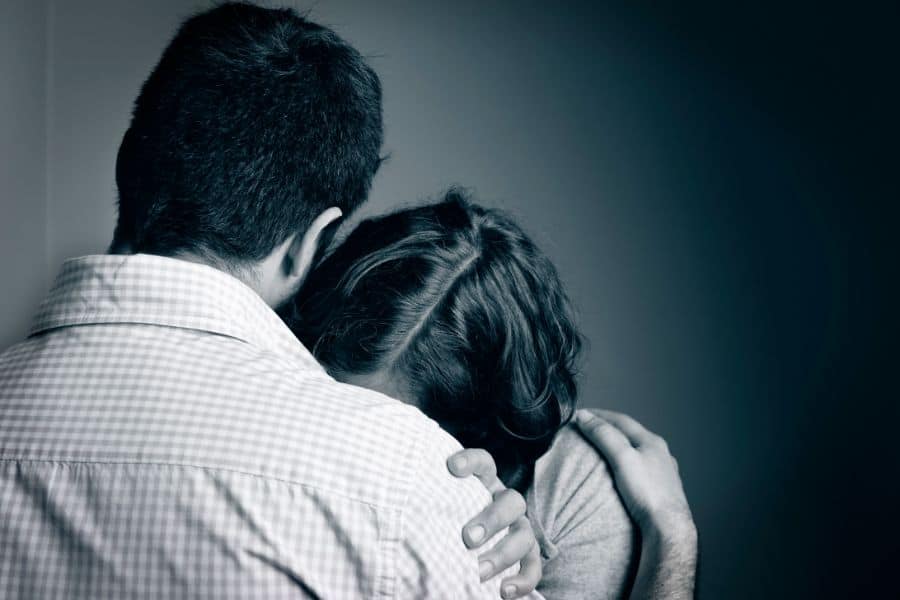If there’s one feeling every parent wishes they could trade for something else, it’s the loss of a child! It’s not only a physical loss but also a psychological and emotional one that leaves the grieved with an intense concoction of emotions and lifetime emptiness of heart.
If your loved one just lost a child, finding how to help or even what to say in the moment of grief can be puzzling. They’re emotionally and mentally in their nightmare moment, so being careful with what you do or say makes sense.
In this blog post, we’ll help you know how you can act when someone close to you loses their son or daughter. We’ll provide you with the dos and don’ts so you handle the whole situation in the best way possible.
8 Things You Can Do To Someone Who’s Lost A Child
If you’re wondering what you can do to offer the best support to your grieved loved one, here are some tried-and-true ways you can help them!
1. Be Present For Them
The first form of support you can do is avail yourself. The grieved one needs someone they can lean on at their lowest moment.
Don’t assume that someone else is doing it. Even if the grieved has a large family or a big group of friends, no one fills your void.
You could help make phone calls, provide rides from the airport, or even as part of the funeral arrangement team. And even if there’s a team already doing all these, your physical presence, even if to offer your ears, would be needed.
2. Ask How They’re Feeling
Even if you have ever lost a child, don’t assume or tell them you know what the loss feels like. Every relationship is unique, and they don’t have to feel the same way you did.
So, enquire about how they’re feeling. We all don’t grieve the same way. To some, the feeling will be accompanied by bitterness. Others may develop guilt from thinking they could have done something to save their child.
So, try and find out how they’re feeling. It may not change anything, but at least it will bring some relief and give you a clearer understanding of their situation.
3. Mention The Child’s Name
Many people avoid this because they think saying the name would make the situation bitter. However, a parent who’s lost a child wants to hear someone acknowledge their lost child. They want to feel that their child was real and that you understand who they’ve lost.
Sure, saying the child’s name may feel uncomfortable. But trust me, most moms and dads want to hear you mention that name. They’d love to listen to you share your personal experience with the child. So, don’t be shy about it. Try and introduce the topic yourself!
4. Offer Practical Help
Know where to support. Ask them where they need you to help. If you’re too close to the family, you can help with some chores. Wash those dishes, do the cooking or come with cooked food, and attend to the physical needs of other children around. If they need emotional support, you’re better positioned to do it.
Of course, don’t expect everything you’re doing to be taken with gratitude at first. But that doesn’t mean they aren’t grateful or that you aren’t doing the right thing. Their mind is so preoccupied with the loss that they may not remember that they should express gratitude.
5. Be Sensitive
The loss isn’t like any other loss, nor do we respond to the loss the same way. For some, it may come with immense anger or other emotions. So, be sensitive about how the grieved is feeling.
If you find them being angered by minor things, don’t say they’re being too petty. They could be in their anger phase. Just ensure that you give them the support they need.
6. Offer Silence And Patience
Don’t be that person who will keep talking all the time you’re with them. It’s okay to share what their lost child meant to you. But then, also know that the grieving have their version to share and need you to also listen to them.
So, know when it’s their turn to speak. Don’t downplay what they’re telling you if it is anything concerning their lost child, even if it seems to cause more tears to either of you.
Again, sometimes a grieving parent will need time to formulate the right words when speaking. Be careful not to interrupt them.
It’s okay for them to pause when overcome with emotions or searching for the correct words to use. Get comfortable with that silence. Don’t try to fill it until you’re sure they’re done speaking.
7. Send Them A Card
If you can’t avail yourself physically for some reasons, send the bereaved family a card. This practice is mostly done when an adult dies, but it can also be a nice gesture to any parent after they lose a child.
A card may look simple, but it can go a long way in comforting the bereaved and giving them the sense that they’re not alone in the difficult moment. Sure, the child won’t bring the child back to life, but it can do them a world of good!
8. Ask Them What Happened
It’s natural to want to shy away from talking with a grieved parent about their lost child. But what most people don’t understand is that more often the parent is only interested in a discussion about their lost son or daughter.
Let the parent share with you what happened to their child. Most of them will be willing to do it. If you can’t hold your tears back during their narration, it’s okay to cry. If they say something funny, laugh along with them.
7 Things You Should Never Do To Someone Who’s Lost A Child
Now that you know what’s right for you to do, it’s also important for you to understand what you should refrain from doing or saying.
1. Avoiding Them
As already said, no one will play your part if you shy away. Seeing your grieved friend coming and crossing the other side of the road or pretending not to see them isn’t cool at all. It’s rude and makes them feel isolated.
Death isn’t contagious, so don’t avoid the grieved. Even if you bump into them and don’t know what to say, just be honest. A simple statement like “… I don’t know what to say to you, but just know that I love you” is enough.
2. Rushing The Process
Sometimes you may feel that the bereaved is taking a longer time to grieve than you expected. Well, those are your expectations, and you may never know the bond they had with the child they’ve lost.
So, avoid using statements like “You should be over this by now.”Allow them to take their time. They’ve lost a dear child, and they’ll never see him or her again. Trying to rush the grieving process may make them feel like you are missing a point.
3. Comparing Losses
We’ve all lost a loved one at some point in our lives. But that doesn’t mean we know how everyone else feels when they’ve lost someone close to them.
Whether you lost your grandma, grandpa, sister, friend, brother, or parent, don’t try to introduce that topic to them. They’ve lost a child, and neither of those! And even if you ever lost your son or daughter, still don’t refer to that scenario to console them.
I’ve said it and will say it again; no two losses are ever equal!
4. Minimizing Their Loss
Avoid any words that will try and minimize the size of the loss. The loss of a child is arguably the greatest for parents. So, give a wide berth to statements that try to downplay that fact.
If the grieved isn’t a believer, avoid using statements like “It was the will of God” or “All things work for the good…” They may be innocent, but they’ll make the parent feel that you don’t sympathize with their loss and pain.
In fact, even when someone is a believer, it’s best to avoid such statements – at least not at such a time.
5. Talking About Their Physical Appearance
At times the grieved may not show the pain of losing their child. But don’t let that fool you into telling them they’re strong or don’t seem to be hard hit by the loss. It’s just not too wise to say such. Our smiles and laughs can sometimes be deceiving.
The fact that they’re laughing the loudest doesn’t mean they’re the least affected or that they’re okay. You never know what happens when they’re in their bed at 2 AM. You may never get to understand how many nights of tears they’ve had in their isolation.
6. Washing The Lost Child’s Clothes
It’s okay to offer practical support to the bereaved family. But be careful when it has anything to do with the lost child. Unless directed, stay away from the clothes and other things that belonged to the deceased.
Most parents will find comfort in anything smelling like their lost child. Hence, don’t blow away their only opportunity to feel their child. Sniffing clothes can bring a calming effect and trigger great memories the parent might never find in anything else.
7. Don’t Post The Picture Of The Child On Social Media
After the burial or even years down the line, avoid posting the snap you may have captured with their child saying that you miss them. It isn’t the best thing to do, especially after the parent has overcome the hardest part of the loss. A simple photo could cause pain to the scar they already have in their hearts.
Conclusion
Losing a child is never an easy time for any parent. While the pain of loss never fully disappears, it’s too heavy to bear at first, and that’s why your support is invaluable. Create time and be there for the grieved person in their difficult and trying moment.
Luckily, with the tips in this article, you now have all it takes to show support and love to the grieved in their trying moment without making things more difficult for them.

